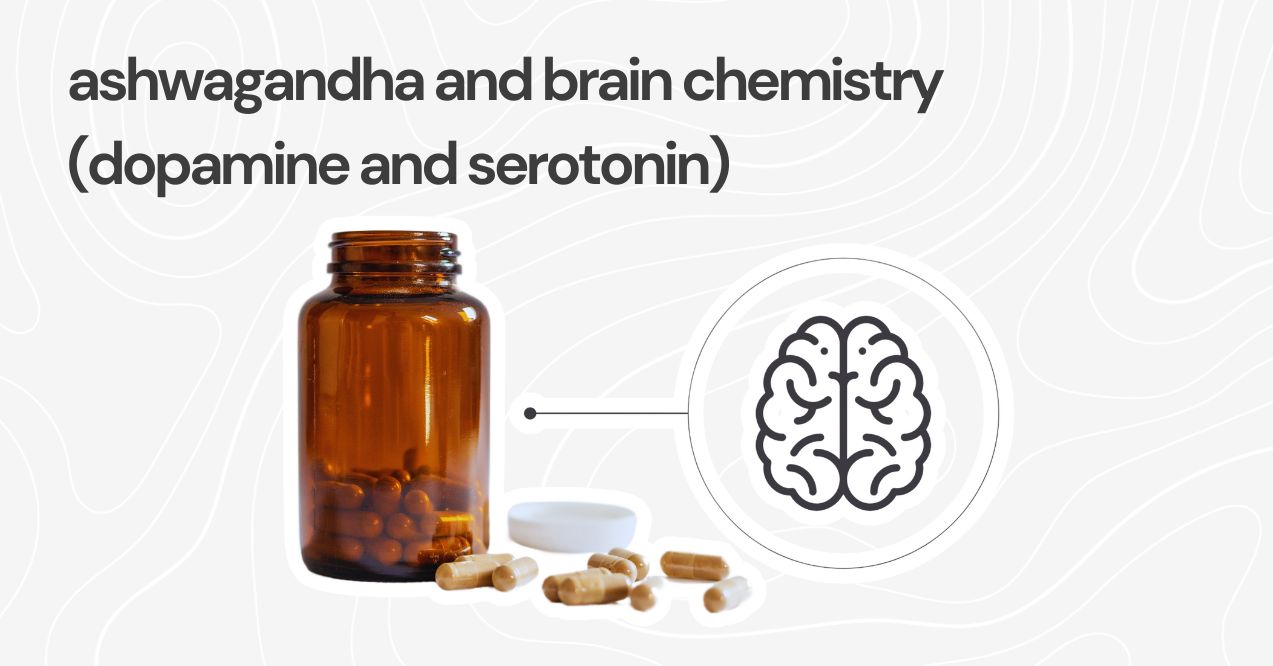The Benefits of Ashwagandha for Brain Fog and Memory
Why are more people turning to ashwagandha as a natural solution for brain fog and cognitive sluggishness? Ashwagandha, often hailed as Indian ginseng or winter cherry, has been a cornerstone of Ayurvedic medicine for centuries. Scientifically known as Withania somnifera, which intriguingly translates to “horse smell” in Sanskrit due to its distinct odor, this herb has a storied history not only in bolstering resilience against stress but also in enhancing overall well-being.
But ashwagandha’s benefits extend beyond its stress-busting prowers. It’s increasingly recognized in modern wellness circles, not just through anecdotal evidence but backed by solid research, for its potential in answering the question of how to get rid of brain fog migraine and improve memory. This surge in popularity sees ashwagandha featured in everything from supplements to teas, offering a natural alternative to conventional treatments, much like other herbs for mental clarity that support cognitive functions.
As we explore the benefits of ashwagandha as brain supplements for brain fog and memory, we’ll also tackle common queries: How quickly can one expect results? And does it induce fatigue, or does it invigorate? Join us as we delve into these questions and more, shedding light on this ancient herb’s modern-day significance.
Key Article Findings:
Brain Fog and Memory Concerns
Is ashwagandha good for brain fog? If you’ve been facing some memory and concentration issues, this becomes a question you may ask yourself. The sensation is unpleasant. You’re confused, lacking clarity, and forgetful (at times, of course). Perhaps you can’t recall specific information or forgot what happened a few days ago. Aging is a common factor for these symptoms, but there are other factors too. What are they?
- Hormonal changes
- Lifestyle factors
- Stress and mental health
- Medical conditions
- Medications
- Environmental factors
Once you’re done figuring out the causes, you can start thinking about the changes. So what helps? You can immediately modify your lifestyle by following some mental clarity and productivity tips, you can eat a balanced diet, and be active. And if these don’t assist you to the fullest, it might be time to discover some natural solutions like ashwagandha.

Is Ashwagandha Beneficial for Brain Fog and Memory?

Before you take ashwagandha for your brain fog, you will most likely want to do some research. In this section, trumeta’s team will explain what a cup of ashwagandha tea or supplement can do for your brain.
1. Relieves Stress and Anxiety
Do you need a stress manager? A dose of ashwagandha helps you handle the chaos that’s happening all around you, whether it’s related to work or kids. As the herb is an adaptogen, it helps the body regulate stress hormones such as cortisol. An elevated level of cortisol is the reason you feel anxious throughout the day. If it lies within a healthy range, you’ll feel calmer and more relaxed.
2. Sharpens Brain Functions
Your brain needs regular practice to stay on point. The cells within must actively communicate with one another to give you better mental clarity. With ashwagandha, you’ll remain alert during important work calls and when helping your kids with their algebra homework. That’s because the herb influences neurotransmitters. It also drives the effectiveness of acetylcholine, which helps with memory and learning.
3. Improves Memory
Our computers have memory discs to store information, much like we have our brains. Unfortunately, our memory function fades as we age. To help with the issue of forgetting things, consider ashwagandha. Aside from influencing acetylcholine, it also enhances synaptic plasticity. That’s a fancy way of describing how your brain synapses support memory formation and recall.
4. Reduces Inflammation
Inflammation happens, whether we’d like it or not. It’s how our body naturally reacts to injury, infection, or harmful stimuli. Sometimes, it’s a chronic situation that persists even for years. Ashwagandha plays a role in reducing inflammation, thanks to bioactive compounds that prevent pro-inflammatory cytokines and enzymes from producing. The herb also regulates cortisol, which relieves stress and subsequently reduces its inflammatory results.
Ashwagandha and Brain Chemistry (Dopamine and Serotonin)

Does ashwagandha make you tired? How does it affect your brain chemistry? Herbs historically renowned for mental clarity generally influence the production of neurochemicals. Here, we’ll explain the links between ashwagandha and dopamine and seratonin.
Ashwagandha and Dopamine
Dopamine influences our mood. It helps us learn and retain information better, too. This may affect how much mental clarity we experience on a daily basis. The best part is that ashwagandha affects dopamine levels. This is good news for everyone who is struggling with anxiety, stress and brain fog. Another reason to consider ashwagandha!
Ashwagandha and Serotonin
Now, how about serotonin? You may have heard of links between low levels of serotonin and depression. In fact, this neurotransmitter affects our mood, emotions, and even sleep. When our serotonin levels are healthy, we feel great.
A serotonin balance is what we need, and that’s what we get from ashwagandha. In effect, it’s a mood enhancer. In addition, it helps the body respond to stress, putting the mind in a calmer state.
Evidence-Based Ashwagandha Facts (Research and Dosage)
Do scientific studies confirm the benefits of ashwagandha for brain fog? Or are the herb’s effects rooted in hearsay and unproven theories? This section will alleviate all your concerns and educate you on how ashwagandha boosts brain health.
Ashwagandha Clinical Studies
In exploring the impact of ashwagandha on brain health, various research findings shed light on its potential benefits. Studies suggest that ashwagandha’s adaptogenic properties play a significant role in stress reduction. Notably, a study published in the Indian Journal of Psychological Medicine in 2012 reported substantial decreases in stress levels among individuals taking ashwagandha.
Furthermore, investigations into memory enhancement have been promising, with a study in the Journal of Dietary Supplements showcasing positive outcomes in memory and cognitive functions. Overall, these studies point towards ashwagandha’s potential role in supporting cognitive function, stress reduction, and memory enhancement.
Ashwagandha Dosage
Here’s a common question: how much ashwagandha should I take? For those considering ashwagandha supplementation, dosage guidelines drawn from clinical studies can provide helpful insights. In general, studies have used doses ranging from 300 mg to 600 mg of ashwagandha extract per day.
When targeting stress and anxiety reduction, effective outcomes have been reported with daily doses between 300 mg and 500 mg of ashwagandha extract. Notably, a study in 2019 demonstrated significant anxiety reduction with a daily intake of 240 mg of withanolides, emphasizing the importance of standardized extracts.
For cognitive benefits, research has commonly employed doses of around 600 mg to 1,000 mg of ashwagandha extract daily. A study in the Journal of Dietary Supplements, which observed improved cognitive tasks, used 300 mg of Ashwagandha root extract twice daily.
Prior to integrating ashwagandha into your routine, especially if you have existing health conditions or take medications, consulting with healthcare professionals is crucial. Responses to ashwagandha can vary, and opting for reputable brands with standardized extracts ensures consistency and reliability in dosages.
Ashwagandha’s Side Effects

While ashwagandha is generally considered safe for many individuals, it’s crucial to be aware of potential side effects and safety considerations, particularly for older adults. Side effects can vary among individuals, and factors such as dosage, individual health conditions, and medication interactions should be taken into account.
- Gastrointestinal Distress – Some individuals may experience upset stomach or diarrhea.
- Allergic Reactions – While rare, allergic reactions such as itching or rash have been reported.
- Changes in Blood Sugar Levels – Ashwagandha may affect blood sugar levels, requiring monitoring for individuals with diabetes.
- Blood Pressure Fluctuations – It may have a mild impact on blood pressure, necessitating caution for those with hypertension.
- Sedative Effects – Ashwagandha’s calming properties might cause drowsiness in some individuals.
Safety Considerations for Older Adults:
- Medication Interactions – Ashwagandha may interact with certain medications, particularly those for blood pressure or diabetes. Consultation with a healthcare professional is wise.
- Individual Health Conditions – Those with pre-existing gastrointestinal issues or autoimmune disorders should exercise caution and seek medical advice.
- Dosage Monitoring – Older adults may be more sensitive to herbal supplements, and it’s crucial to monitor dosage carefully.
Before incorporating ashwagandha into your routine, especially if you are an older adult or have existing health conditions, seeking advice from a healthcare professional is paramount. They can provide personalized guidance based on your health history, ensuring a safe and beneficial experience. Always consider your health status, potential interactions, and any ongoing medications before integrating the herb into your wellness routine.
How to Choose the Right Ashwagandha Supplement
Are you ready to use ashwagandha for brain fog? Selecting a high-quality ashwagandha supplement is crucial to ensure its effectiveness and safety. Here are practical tips to help you make an informed choice:
- Choose a supplement with standardized Ashwagandha extract, indicating a consistent and reliable level of active compounds, such as withanolides.
- Opt for products that undergo third-party testing for purity and quality. This ensures that the supplement is free from contaminants and meets quality standards.
- Organic certification indicates that the ashwagandha has not come into contact with synthetic pesticides and fertilizers. This can be especially important for those seeking a more natural and clean supplement.
- Ashwagandha root extracts are commonly used in supplements as they contain the highest concentration of active compounds. Check the product label to ensure it specifies the use of the root.
- Avoid supplements with unnecessary additives, fillers, or artificial ingredients. A clean and minimal ingredient list is preferable.
- Withanolides are the key bioactive compounds in ashwagandha. Look for information on the label indicating the percentage of withanolides to ensure potency.
- Choose products from reputable and trusted brands. Look for supplements made by companies with a history of producing high-quality herbal products.
- Capsules offer convenience in dosage, while powders provide flexibility. Choose a form that aligns with your preferences and lifestyle.
- Ensure the supplement is free from common allergens if you have specific sensitivities. This information is typically found on the label.
- Customer reviews and recommendations can provide insights into the effectiveness and tolerability of a specific Ashwagandha supplement.
By being diligent in examining labels and choosing products from reputable sources, you increase the likelihood of selecting a high-quality ashwagandha supplement that aligns with your health goals.

While we’re on the subject of supplements for brain fog, you’d be interested to discover a trumeta’s mushroom coffee mix made of lion’s mane, cordyceps, and reishi mushrooms. These are highly beneficial for mental acuity. Aside from that, this drink also improves energy levels, metabolism, mood, immunity, and overall well-being.
How to Take Ashwagandha
If you’re wondering how and what time of day to take ashwagandha, we’re here to help. You can take it as a (powdered) drink in the morning to kickstart your day. A capsule taken with breakfast will provide the same effects. People also take ashwagandha to wind down after a long day. Blending the herb with chamomile or lavender promises optimal relaxation and well-being.
If you’re a strong proponent of convenience, you’ll find supplements in the form of powders and capsules highly valuable. Powders will go great in smoothies and teas, while capsules are easily consumed.
Remember, supplementing with ashwagandha is just one piece of the puzzle. A holistic approach that includes a balanced diet, regular exercise, stress management, and other healthy habits enhances the potential cognitive benefits.
Key Takeaways
Incorporating ashwagandha into your daily routine for cognitive health offers a promising path to promoting overall well-being. By combining the adaptogenic benefits of ashwagandha with a holistic approach to wellness, you create a comprehensive strategy on how to improve mental clarity.
Taking ashwagandha for brain fog isn’t only for the believers of Ayurvedic health practices. The adaptogenic properties of ashwagandha, coupled with its potential positive impact on stress reduction, make it a valuable addition to a healthy lifestyle. One should approach supplementation with the following:
- A mindful mindset
- Consultation with healthcare professionals (to ensure a personalized and safe integration into your routine)
- Balanced diet
- Physical activity
- Healthy sleep habits
Remember, the journey to cognitive well-being is multifaceted, and a harmonious blend of ashwagandha and holistic lifestyle choices can contribute to a clearer, focused, and resilient mind. At the same time, get acquainted with other natural ingredients, such as reishi, cordyceps, and lion’s mane mushrooms. These aren’t just excellent for brain function but also immunity and energy levels.
Ashwagandha, thanks to its adaptogenic qualities and effects on neurotransmitters, is excellent at combating brain fog.
Different people react differently to ashwagandha. Some notice positive (subtle) effects after two weeks of daily consumption, while others take longer. The dosage influences the speed at which ashwagandha takes effect, too.
Ashwagandha is good at any time of the day, but many take it in the morning (for improved energy levels) or the evening (for stress reduction). Others prefer taking the herb during mealtimes for enhanced absorption and reduced gastro discomfort.
As with most natural herbs, there’s no one-size-fits-all dosage recommendation. However, most guidelines stick to 300 to 600 mg of ashwagandha extract daily. Experts recommend starting at a lower dose and increasing it gradually while paying attention to the body’s reactions.
In general, ashwagandha helps the body adapt to stress. It promotes hormonal balance and may result in a sense of calm and relaxation. You may mistake this for tiredness.
People react differently to ashwagandha. Some get headaches, but that’s usually associated with improper dosages. If you’re new to ashwagandha, start with a lower dosage and work your way up if necessary. At the same time, ensure that your supplement comes from a reputable source.
Advertisement. This site offers health, wellness, fitness and nutritional information and is designed for educational purposes only. You should not rely on this information as a substitute for, nor does it replace, professional medical advice, diagnosis, or treatment. If you have any concerns or questions about your health, you should always consult with a physician or other health-care professional. Do not disregard, avoid or delay obtaining medical or health related advice from your health-care professional because of something you may have read on this site. The use of any information provided on this site is solely at your own risk.







